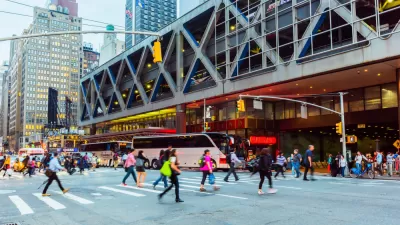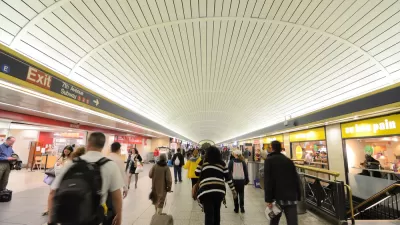For those keeping track at home, the Port Authority report that estimated the cost of a new bus terminal in Midtown came in at ten times the original estimate a year ago.
"It could cost more than $10 billion to replace the Port Authority Bus Terminal at its current location with a bigger, better facility, according to a Port Authority study whose preliminary results will be presented to the board of commissioners Thursday," reports Dana Rubinstein.
"That's 10 times the $1 billion price estimate some officials circulated last year," adds Rubinstein.
And if that daunting price tag weren't enough to scare away curious onlookers, how about the other remaining challenges facing the project: "Were the construction and environmental review process to begin tomorrow—which it won't, because there is no funding on the immediate horizon—it would take at least 15 years to complete, according to three Port Authority officials who would only speak on background with Capital."
The report made big news around New York. Steve Strunsky focuses on how the price tag ballooned so much in such a short amount of time. And Stephen Miller also takes a big picture approach to how the plan fits into the Port Authority's capital investment plans.
FULL STORY: Plans for a new bus terminal confront steep cost estimates

Americans May Be Stuck — But Why?
Americans are moving a lot less than they once did, and that is a problem. While Yoni Applebaum, in his highly-publicized article Stuck, gets the reasons badly wrong, it's still important to ask: why are we moving so much less than before?

Study: Maui’s Plan to Convert Vacation Rentals to Long-Term Housing Could Cause Nearly $1 Billion Economic Loss
The plan would reduce visitor accommodation by 25,% resulting in 1,900 jobs lost.

Using Old Oil and Gas Wells for Green Energy Storage
Penn State researchers have found that repurposing abandoned oil and gas wells for geothermal-assisted compressed-air energy storage can boost efficiency, reduce environmental risks, and support clean energy and job transitions.

San Diego Swaps Parking Lane for Kid-Friendly Mini Park
The block-long greenway will feature interactive play equipment and landscaping.

Tracking the Invisible: Methane Leaks From LA’s Neighborhood Oil Sites
Environmental advocates are using infrared technology to monitor and document methane leaks from neighborhood oil sites, filling regulatory gaps and pushing for stronger protections to safeguard community health and the climate.

Montana Bill Promotes Parking Reform
A bill before the Montana state senate would bar cities from requiring more than one parking spot per new housing unit.
Urban Design for Planners 1: Software Tools
This six-course series explores essential urban design concepts using open source software and equips planners with the tools they need to participate fully in the urban design process.
Planning for Universal Design
Learn the tools for implementing Universal Design in planning regulations.
Caltrans
Heyer Gruel & Associates PA
Institute for Housing and Urban Development Studies (IHS)
City of Grandview
Harvard GSD Executive Education
Salt Lake City
NYU Wagner Graduate School of Public Service
City of Cambridge, Maryland





























